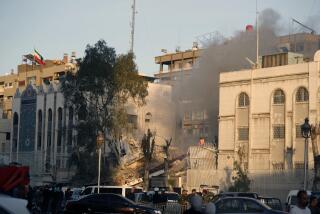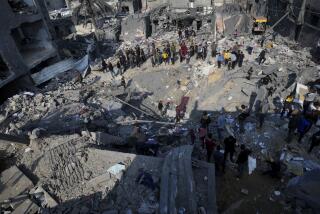Under U.N. eye, destruction of Syrian chemical weapons begins
BEIRUTâThe historic destruction of Syriaâs chemical weapons arsenal began on Sunday, as a team of disarmament experts hastened to comply with an international mandate to eliminate the nationâs massive chemical stockpiles by mid-2014.
Syrian personnel under international supervision used cutting torches and other tools to destroy an array of items, including missile warheads, aerial bombs and mixing and filling equipment, the United Nations said Sunday in a statement. The process will continue in coming days, the U.N. said.
The accelerated program is widely viewed as an unprecedented attempt to rid a country of its chemical arsenal under a tight deadline while a civil war still rages within the nationâs borders.
The ambitious effort is the result of an accord brokered last month by the United States and Russia that helped avert threatened U.S. missile strikes in retaliation for Syriaâs alleged use of poison gas. Hundreds are reported to have died in attacks on Aug. 21 in Damascus suburbs generally under the control of Syrian rebels, although the fatality toll is disputed.
Syrian President Bashar Assad has denied U.S. charges that his forces were behind the gassing, and blamed the chemical strike on rebels seeking to trigger Western intervention in Syriaâs civil conflict. The Syrian opposition dismissed allegations from Syria and its chief ally, Russia, of having orchestrated the gas attack.
A U.N. investigation concluded that sarin, a toxic nerve agent, was probably released via surface-to-surface missiles in the stricken zone, but did not assign blame for the attacks.
Nonetheless, Assad quickly agreed to a U.N.-backed eradication plan in a bid to avoid potentially crippling U.S. airstrikes. President Obama said he decided to postpone the airstrikes once Syria agreed to abide by the terms of a strict international blueprint to dispose of its chemical arsenal.
An advance team of international experts arrived in Damascus last week, established a logistics base and began the complex process of identifying and destroying Syrian chemical weapons stocks, estimated to total about 1,000 tons of deadly agents, along with various production and storage facilities. The material is believed to be scattered in dozens of sites across government-controlled territory.
As the destruction proceeds, the international technicians in Syria are continuing to verify information supplied by Syrian authorities about the nationâs chemical program, the U.N. said.
A U.N. Security Council resolution set Nov. 1 as an initial deadline to destroy Syriaâs ability to produce chemical weapons.
On Friday, the disarmament inspectors in Damascus reported âencouraging initial progressâ after their first working day of meetings with Syrian authorities. The team labeled as âpromisingâ documents handed over by Syrian officials, who are required to disclose the sites of chemical weapons facilities and other pertinent details. The U.N. has called the Syrian government cooperative in the large-scale and complex undertaking.
Until last month, Syria had never acknowledged publicly that it even possessed a chemical weapons program.
The destruction began Sunday at an unspecified site or sites in Syria under the management of experts from the United Nations and the Hague-based Organization for the Prohibition of Chemical Weapons, which implements the international treaty banning the use and production of such arms. Syria has signaled its intention to become a party to the Chemical Weapons Convention, which includes 189 member states.
Syria has maintained its chemical weapons stockpiles as a potential deterrent to attack from neighboring Israel, which is widely believed to have both chemical and nuclear weapons in its arsenal.
ALSO:
Bomb kills four NATO troops in Afghanistan
U.S. raids in Libya, Somalia reflect shift away from drone strikes
Vehicle at Mexican âmonster truckâ show plows into crowd, killing 8
More to Read
Sign up for Essential California
The most important California stories and recommendations in your inbox every morning.
You may occasionally receive promotional content from the Los Angeles Times.










